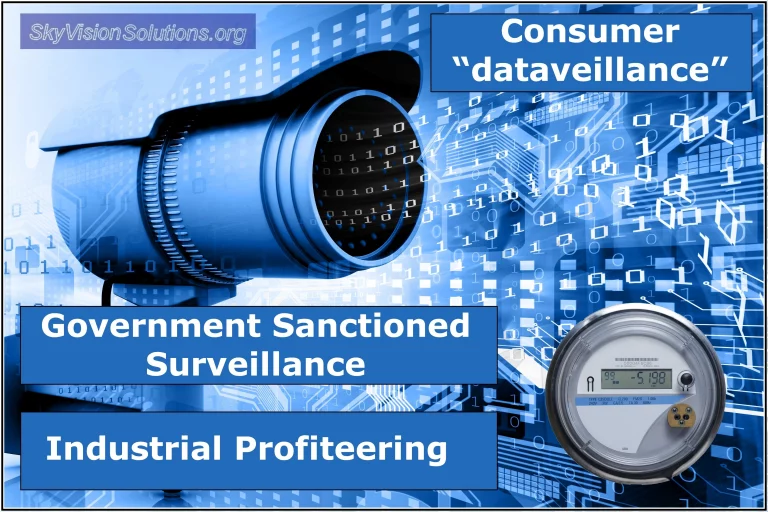New law: by 2032, almost every German household will be monitored by smart meters.
Image credit: Smart Grid Awareness
It’s unavoidable: history shows that as technology develops, governments use it to control and monitor the masses. The latest are smart electricity meters.
But how could you not want them? There’s an energy crisis after all, and the intelligent meters will help us overcome this and help us use energy more efficiently and wisely. Why on earth would anyone resist that? It’s for the common good, after all. In times of crisis, there is no time for long discussions.
Draft law approved
Germany online site Blackout News here recently reported that the German cabinet has approved a draft law that will aim to digitize the country’s green energy transition and install smart electricity meters in every home.
Installation is planned to be mandatory from 2025.
The draft law: “Law to Restart the Digitization of the Energy Transition,” foresees the use of intelligent electricity meters. that will automatically transmit consumption to electricity providers.
“By 2032, the majority of households should have switched to the new technology,” reports Blackout News.
As Germany struggles today to supply electricity, the job of balancing out the grid will be made easier through the smart meters, lawmakers claim. “From 2025, installation is to be mandatory for consumers who use between 6000 and 100,000 kilowatt hours. By the end of 2030, 95 percent of these consumers are to be equipped with smart meters.”
Will be passed “in just a few weeks”
Economics Minister Habeck says the smart meters are necessary because: “The expansion of renewable energies and the greater use of electric cars in the transport sector and heat pumps in buildings require an intelligent link between power generation and consumption,”
“The law is therefore expected to come into force in just a few weeks.”
More costs for consumers, much less privacy
Of course, the intelligent meters are going to cost consumers. According to the Federal Environment Agency, “these meters consume an average of 26 kilowatt hours per year themselves”, will have a “significantly shorter service life” and need replacement “every twelve years on average”. Supposedly consumers will be able to save money via “flexible electricity tariffs”.
Critics warn that the data privacy of consumers will be infringed and face the risk of being hacked.
From citizens, to inmates
It’s the next phase to Big Brother, to be accompanied by central bank digital currencies, digital IDs, reduced private property rights, digitized health care, smart cars, censored media and full coverage surveillance facial recognition cameras watching your every move. We’ll soon go from being citizens of a country, to inmates of the planet. The cornerstones have long been laid, and the walls are rising quickly.






[…] From NoTricksZone […]
Can’t manage supply so will instead manage demand. Can’t think of a more complete indictment of UN reliable green energy than that.
Ten years from now thousands of average families will be waiting for a holiday meal to cook, say maybe Sauerbraten with all the extras. As each oven and stove top is added to the draw on the grid an algorithm will monitor the total usage and at a pre-designed level begin to lock-out continued energy to the houses that started cooking first.
Those early started meals will be half-cooked. Now for 3 or 4 hours they rest. As others are turned off, eventually some get turned back on. Thus, about 6 hours after the family intended to eat, the meal will be ready.
Enjoy! 😊
Perhaps we will see a growth in the use of barbecues for home cooking using things like the excellent Cobb for roasting, baking and stews.
[…] Image: Big Brother Keeps Getting Bigger: Smart Meters In Germany Mandatory Beginning 2025! […]
Yep, much the same lies they tell us in the UK about ‘smart’meters while missing out facts like you can be turned off remotely or have your meter changed to pre-pay remotely. Having had a couple of monitors provided free I can tell you that the novelty wears off and they are just put in a drawer and forgotten about as you get on with your life.
Are the numbers right for the watts? 6000 kilowatts (per?) hour is no regular home, even 6000 watts per hour is no regular home.
>these meters consume an average of 26 kilowatt hours per year themselves
It makes no sense.
Watt is Joule per time. Watt hours (not per) is Watt by time is Joule.
Watts by default, as in the values of the labels of electrical appliances are consumption per hour, explaining the semantics doesn’t address the issue of 6000 kilowatts which is 6MW, no home consumes that.
It explains that you are not looking at a value of power but at a value of energy. This is not semantics it is physics.
https://www.youtube.com/watch?v=gAV8_D71M0o